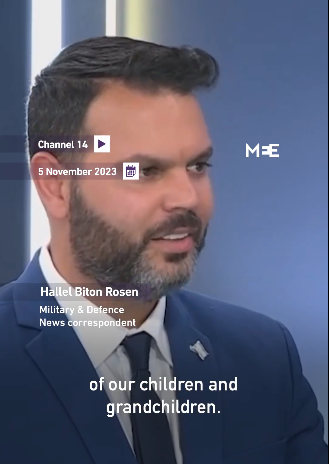Invade Gaza and expel Palestinians living there to protect our children, says Hallel Biton Rosen
Hallel Biton Rosen, a military and defense news correspondent, recently shared his opinion on Israel’s Channel 14. He asserted that the only way to protect Israeli children would be to invade Gaza and expel Palestinians living there, with the intention of building new settlements. But not everyone in Israel agrees with this viewpoint, which has caused considerable controversy.

Some Israeli politicians and human rights organizations have strongly condemned Hallel Biton Rosen’s comments, stating that they go against the principles of democracy and human rights. They argue that expelling Palestinians from their homes is a violation of international law and would only escalate the violence in the region. Others have pointed out that such an action would not guarantee the safety of Israeli children, but rather put them at greater risk of retaliation and further conflict. Despite these criticisms, Biton Rosen’s opinion has sparked a heated debate in Israel about the country’s approach to national security and its relationship with Palestine.
Some have suggested alternative solutions to the ongoing conflict, such as investing in education and economic development in Gaza to improve living conditions and reduce tensions. Others advocate for a diplomatic approach, involving negotiations with Palestinian leaders and international mediators to find a peaceful resolution. The debate continues, with no clear consensus on the best path forward. However, it is clear that any solution must prioritize the safety and well-being of both Israeli and Palestinian children, as well as respect for human rights and international law.
Some have also proposed a two-state solution, where Israel and Palestine would exist as separate states with defined borders. This approach has been supported by some international organizations and leaders, but has faced opposition from hardline factions on both sides. The complexity of the conflict and the deeply held beliefs of those involved make finding a resolution difficult, but it is crucial that efforts continue to be made towards peace. Ultimately, any solution must prioritize the safety and well-being of all people in the region, regardless of their nationality or religion. Only through dialogue, cooperation, and respect for human rights can lasting peace be achieved.
Some have also suggested a one-state solution, where Israelis and Palestinians would share the land as equals. This approach has been advocated by some activists and intellectuals, but faces significant challenges in terms of governance and power-sharing. The debate over the best path forward for Israel and Palestine remains complex and contentious, but it is clear that any solution must prioritize the safety and well-being of all individuals involved. It is important for leaders on both sides to engage in honest dialogue and work towards a peaceful resolution that respects human rights and international law. The future of the region depends on finding a sustainable solution that allows all people to live in dignity, security, and peace.
Some have also proposed a three-state solution, where Gaza would become its own separate state. This approach has been suggested by some experts as a way to address the unique challenges faced by Gaza, such as high population density and limited resources. However, it remains to be seen whether this solution would be feasible or widely accepted by both Israelis and Palestinians. Regardless of the specific approach taken, it is crucial that any solution prioritize the safety and well-being of all individuals involved and respect international law. The ongoing conflict in Israel and Palestine is complex and deeply rooted, but with continued efforts towards dialogue and cooperation, there is hope for a peaceful resolution that benefits everyone in the region.
